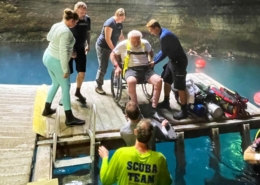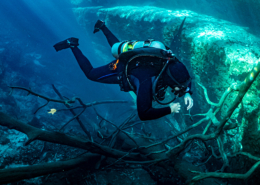Don’t Just Go Through the Motions
By Mike McNeil
Be a responsible diver. Don’t just go through the motions!
One of my biggest pet peeves is hearing someone say, “scuba diving is a safe sport.” No, ping pong is safe. Scuba diving has become a lot safer over the years, but we are still breathing underwater, and that comes with it an inherent risk. Some of those risks include: malfunctioning equipment, barotraumas, narcosis, marine life injuries, decompression sickness, and drowning, to name a few. It is risks like these that we must train to limit, and we do that by being a responsible diver.
Gear Maintenance
The responsible diver takes good care of their gear before, after, and during every dive and has their gear serviced annually. Prior to each dive, they take out their gear and go through it. They make sure everything is functioning properly, batteries are fully charged, there are no rips, tears, or leaks and the air they are going to dive is good.
Getting dressed and during the dive, their gear is streamlined and easily accessible. Nothing is swinging around banging into anything or dragging on the ground or bottom. After each dive, the responsible diver rinses and dries their gear and then stows it properly. They clean their gear when it is needed and treat their gear properly to help ensure that it lasts a long time. They have their gear serviced annually.
Most manufacturers require their product to be serviced annually by a certified service technician in order to keep the warranty valid. The diver that goes through the motions lets their gear bake in the sun and does not get their gear serviced because “everything is working fine and when something has an issue is when I’ll get it serviced.” Unfortunately, you have no power over when a piece of equipment might fail, and that is a risk no diver should take.
Predive Safety Check
The predive safety check is one of the most important activities every diver should do before entering the water. A proper predive safety check includes checking your dive buddy’s air and ensuring they have enough to accomplish the dive you planned, making sure there is air in their BCD, and familiarizing yourself with their gear. Make sure you know if they have an octopus or air integrated BCD in case there is an out of air situation. Do they have a weight belt or is the BCD weight-integrated and are the weights in the BCD? Are there quick releases to get them out of their gear fast if there’s an emergency? Is their dive computer on and functioning properly? Do they have all their dive gear: mask, fins, snorkel, weights, etc.?
If everything is good, it is now time to enter the water. Unfortunately, this task is constantly overlooked by people going through the motions. I always tell my groups to remember your predive safety check, then watch them. What I have seen lately has been disturbing, to say the least. I have gotten to the point that if I see people go through the motions, I have them face away from their buddy and quiz them:
- How much air does your buddy have?
- Do they have an octopus or air integrated BCD?
- Do they have quick releases on their BCD?
- Do they have all their gear including weights?
These are all things a responsible diver checks, in addition to reviewing hand signals and going over the dive plan. A solid predive safety check can help to avoid unwanted situations at depth.
A Good Dive Buddy
A responsible diver is a great dive buddy. They do a thorough predive safety check, they review hand signals make a dive plan, then follow that plan. They discuss what-if scenarios prior to the dive so if something comes up during that dive, they already have a plan to mitigate the issue. They always stay within arms-reach of their dive buddy and constantly check on their dive buddy’s air to make sure they are doing ok. They identify points of interest and are a pleasure to dive with.
After the dive, a good dive buddy assists their partner by helping them get out of their gear safely and helping them secure it. Is this your practice? Or are you the dive buddy that does a poor predive safety check, leaves your buddy underwater to look at something, and is all over the place with buoyancy and distractions? If so, you are going through the motions and are not a responsible diver.
Continuing Education
A responsible diver furthers their knowledge by reading articles, books and magazines, and takes additional courses to further their knowledge and become a better diver. Rescue Diver and Solo Diver courses help to make efficient and effective divers and dive buddies. I had a student once tell me that the reason he was taking the Solo Diver course was not only to learn the skills to be self-sufficient, but to be a better dive buddy and have a redundant air source that he could share with anyone who might need it. Yes, that would fit the definition of a responsible diver and not someone just going through the motions.
Dive Logs
A responsible diver continues to log their dives. They make good notes about the dive site so they can remember the dive and tell others about it. They take care of their logbook, always know where it is, and take it with them when they go diving. People who go through the motions complain about this task.
The Challenge
I want to challenge everyone out there to become that responsible diver. Read the articles, take the continuing education classes, and be the person everyone wants to dive with. Talk to your instructors and dive shop owners. These people have hundreds and thousands of dives under their belt and they can help you be a better diver. Those who have, know these people love to talk diving and share their stories. Those stories educate and enlighten and help to open new opportunities and dive adventures for you. Good luck, stay safe, and please be responsible!!










Leave a Reply
Want to join the discussion?Feel free to contribute!